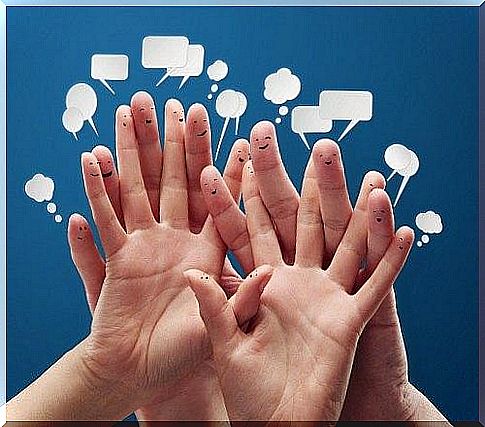I Have No Social Skills, What Can I Do?

Even if they don’t have a precise definition, we all talk about it. Social skills are the set of behaviors that help us relate to others and that we usually learn by imitation .
They determine the way we behave in front of others and manifest themselves, for example, through the way we speak in public or how we approach a stranger to strike up a conversation.
Social skills are closely related to psychology, and for this reason you can talk to a psychologist if you feel you are lacking them. But first of all, it’s worth trying to understand what it is, instead of claiming that you don’t have any. Remember that being pessimistic never helps!
What are social skills?
Social skills have been studied and analyzed by psychology for decades. In fact, the first research on this topic dates back to 1949. It is thanks to all these years of study and research that we can finally classify social skills into different groups, organized as follows:
- Group 1: includes core skills, such as listening, initiating and holding a conversation, thanking, asking a question, introducing and introducing another person, conversing, empathizing, or giving a compliment.
- Second group: includes advanced social skills, such as giving and following instructions, asking for help, apologizing, participating, giving one’s opinion and convincing others.
- Third group: these are the skills related to what we feel. These include knowing and expressing feelings, understanding the feelings of others, expressing affection, facing the anger of others, indulging in some rewards and facing fears.
- Fourth group: concerns the skills related to self-control, such as asking permission, helping, sharing, wanting, negotiating, having self-control, reacting to a joke, defending one’s rights, avoiding having problems with others or arguing.
- Fifth group: the skills that allow us to deal with stress fall into this last category. For example, making and responding to a complaint, dealing with shame, persuasion, accusation or failure, defending someone, responding to a contradictory message, preparing for a complicated conversation, and facing pressure.

Empathy and social skills
Here we are again faced with a word that we don’t use very often, but which represents an everyday reality. L ‘ Empathy allows us to understand what others feel, to put ourselves in their shoes and act accordingly. Unlike what many people think, it does not necessarily mean “treating others as we would like to be treated”, because, fortunately, not everyone likes the same things.
Being more or less empathetic doesn’t always depend on our education. Nor is it an innate trait that we inherit at birth. Women are believed to be more so than men, as they need to understand what their children want when they are still small. For this reason, it seems that women have a higher sensitivity and a more developed social ability, because it has been an important factor of natural selection.
Being empathetic with one or more people is the first step in making others comfortable in the conversation. If you start to be more empathetic, you will be more sympathetic to people, you will be able to be more persuasive, you will be heard, you will be more motivated and you will be able to understand what others are feeling.

How to improve social skills?
Now let’s abandon the theory and move on to practice. It’s the trickiest part, but it’s worth tackling. Here are some techniques you can use to improve your social skills:
- Pay attention to the tone of voice, body position, gaze and even the silences of your interlocutor. This is all information that he puts at your disposal. It is good to know how to grasp them and use them as tools in your favor.
- Try to imagine what motivates the other person when they have to do something. How do you think he would react if he faced a problem?
- Try to get the other to play his part. Ask him how he is and let him answer openly. Show interest in what he tells you.
- Don’t state your conclusions. Avoid phrases like “your problem is that …” or “in my opinion, you are wrong at …” because the other could interpret them as a sermon on your part and close up like a hedgehog.
- Reword your sentences so that your interlocutor feels understood. For example: “I think it is this situation that affects your mood …” or “It seems to me that you have valid reasons to feel tired”, etc.
- Put yourself in the other person’s shoes. Make the effort to abandon your point of view and take that of the person in front of you or on the other end of the phone for a moment.
If you improve your social skills, you will immediately notice improvements in your relationships. In a short time, they will increase and above all they will become richer. Furthermore, these skills will not only improve your most emotional social circle, but they could be very useful in the world of work!









